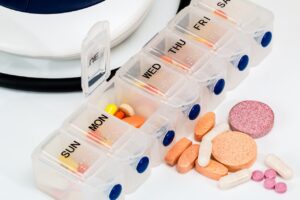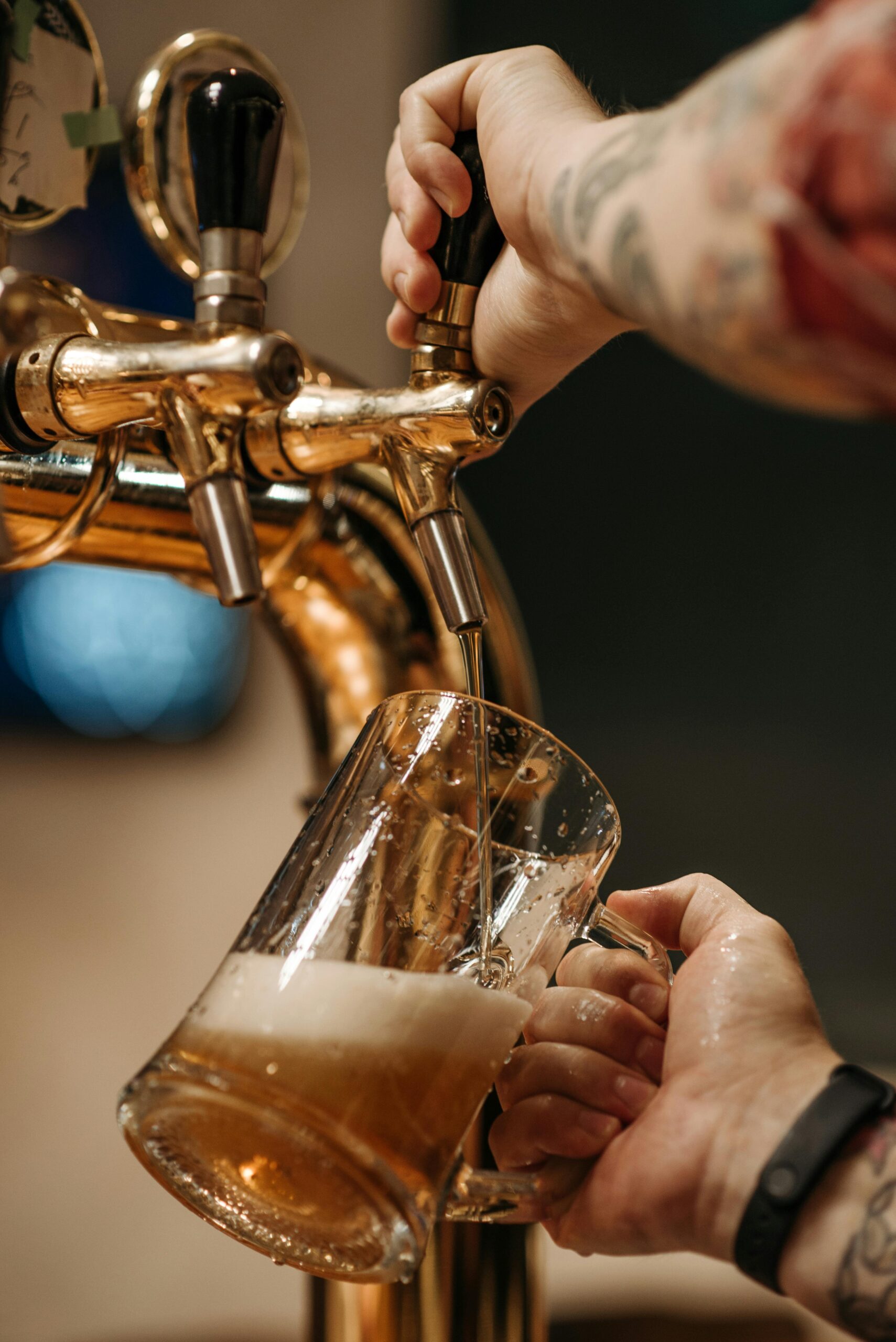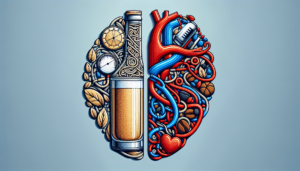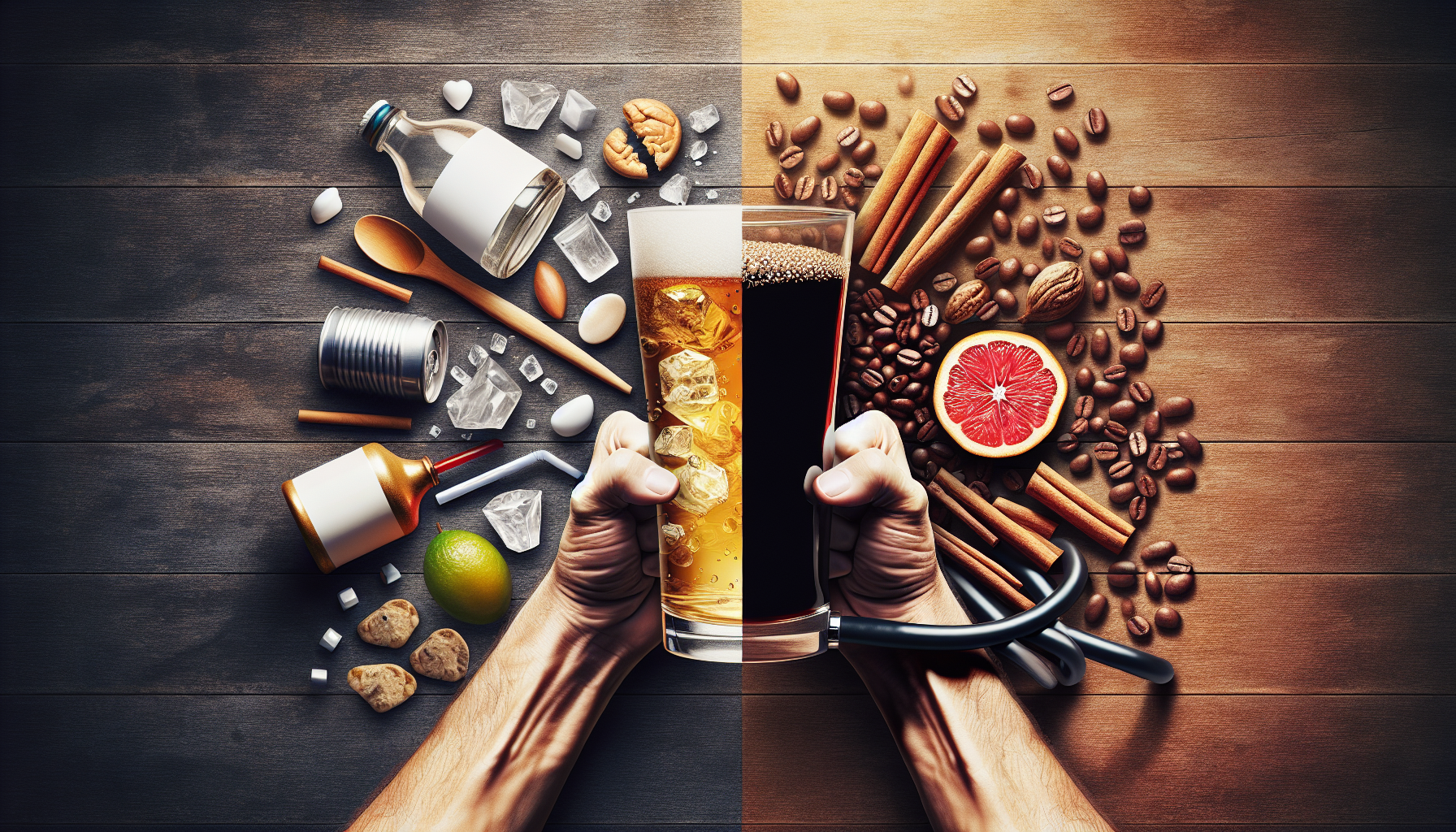Have you ever wondered how alcohol and caffeine impact your blood pressure? Recent scientific studies have shed some light on this intriguing topic. According to a study conducted by researchers at the University of Fribourg in Switzerland, excessive alcohol consumption has been found to increase blood pressure levels, increasing the risk of cardiovascular diseases. On the other hand, a study published in the American Journal of Hypertension suggests that moderate caffeine intake may temporarily elevate blood pressure, but it does not have a long-term effect. These studies highlight the importance of understanding the impact of alcohol and caffeine on our blood pressure, allowing us to make informed choices about our health.
Discover the Ultimate Weight Loss Secrets Here!
Alcohol and Blood Pressure
Effect of Alcohol on Blood Pressure
Alcohol consumption can have a significant impact on blood pressure. While moderate drinking may not necessarily cause long-term effects on blood pressure, excessive or chronic alcohol intake can lead to hypertension (high blood pressure). Studies have shown that heavy drinking can raise blood pressure both in the short term and over time.
One study published in the American Journal of Epidemiology found that heavy alcohol consumption was associated with increased blood pressure levels, particularly among men. The researchers observed a positive correlation between the number of alcoholic drinks consumed per day and systolic blood pressure. Additionally, binge drinking was found to have a more substantial effect on raising blood pressure compared to regular moderate drinking.
Mechanism of Action
The exact mechanism by which alcohol affects blood pressure is not fully understood, but there are a few potential explanations. Firstly, alcohol can lead to the release of stress hormones like adrenaline, which can constrict blood vessels and increase blood pressure. Moreover, excessive alcohol consumption can also damage the arteries, causing inflammation and narrowing the passages through which blood flows.
Furthermore, alcohol can impair the function of the liver, which plays a crucial role in regulating blood pressure. Alcohol-related liver disease can disrupt the body’s fluid and electrolyte balance, leading to increased blood pressure. It is important to note that these mechanisms may vary from person to person and can be influenced by factors such as genetics and overall health.
Alcohol and Hypertension
Hypertension, or high blood pressure, is a chronic condition characterized by elevated blood pressure levels persistently exceeding the normal range. Alcohol consumption is considered a significant risk factor in the development of hypertension.
A study published in the Journal of Clinical Hypertension found that heavy drinking was associated with an increased risk of developing hypertension. The researchers observed that both men and women who consumed more than three alcoholic beverages per day had a significantly higher risk of developing hypertension compared to non-drinkers or moderate drinkers.
It is worth noting that while moderate alcohol consumption may not directly lead to hypertension, individuals with hypertension should be cautious and limit or avoid alcohol intake to avoid exacerbating their condition.
Alcohol and Blood Pressure Medications
If you are taking medications to manage your blood pressure, it is essential to be aware of potential interactions with alcohol. Certain blood pressure medications can interact negatively with alcohol, diminishing their effectiveness or increasing the risk of side effects.
One study published in the Journal of Hypertension examined the effects of alcohol on antihypertensive medications. The researchers found that alcohol consumption can reduce the effectiveness of some medications, such as beta-blockers and ACE inhibitors. This could potentially lead to inadequate blood pressure control and increase the risk of complications associated with hypertension.
It is crucial to consult with your healthcare provider or pharmacist regarding alcohol consumption while taking blood pressure medications. They can provide specific guidance based on the medications you are prescribed and any potential interactions.

Click Here for Proven Fat-Burning Strategies!
Caffeine and Blood Pressure
Effect of Caffeine on Blood Pressure
Caffeine, a widely consumed stimulant found in coffee, tea, energy drinks, and various other products, can also have an impact on blood pressure. While the effects of caffeine on blood pressure differ among individuals, it generally causes a temporary increase in blood pressure.
Research published in the Journal of the American Heart Association found that people who rarely consume caffeine experienced a more pronounced elevation in blood pressure after caffeine intake compared to habitual caffeine consumers. Regular caffeine consumers tend to develop a tolerance to its hypertensive effects over time.
Mechanism of Action
Caffeine stimulates the central nervous system, leading to increased heart rate and contraction, which results in temporary constriction of blood vessels. This constriction can cause an immediate rise in blood pressure. However, the duration of this effect varies depending on factors such as the amount of caffeine consumed, individual sensitivity, and overall health status.
Caffeine and Hypertension
The evidence regarding the long-term effects of caffeine on hypertension risk is conflicting. Some studies suggest that regular caffeine consumption may lead to a modest increase in blood pressure, while others have found no significant association.
A recent meta-analysis published in the American Journal of Clinical Nutrition analyzed multiple studies and concluded that caffeine intake was not linked to a higher risk of hypertension. However, it is important to note that individual response to caffeine can vary, and some individuals may experience a more pronounced increase in blood pressure.
If you have hypertension, it is advisable to monitor your caffeine intake and observe any noticeable effects on your blood pressure. Discussing caffeine consumption with your healthcare provider can help provide personalized recommendations based on your specific situation.
Caffeine and Blood Pressure Medications
Similar to alcohol, caffeine can potentially interact with certain blood pressure medications. For individuals taking medications to manage their blood pressure, caffeine may affect the effectiveness or increase the risk of side effects.
For example, caffeine can inhibit the absorption of calcium channel blockers, a common type of blood pressure medication. This interference can lead to reduced efficacy in lowering blood pressure. It is crucial to consult with your healthcare provider or pharmacist regarding any potential interactions between caffeine and your prescribed blood pressure medications.

Combined Effects of Alcohol and Caffeine
Synergistic or Additive Effects
When alcohol and caffeine are consumed together, their effects on blood pressure may differ from when they are consumed separately. Some evidence suggests that the combination of alcohol and caffeine can result in synergistic or additive effects on blood pressure.
A study published in the Journal of Studies on Alcohol and Drugs investigated the effects of energy drinks, which often combine alcohol and high levels of caffeine. The researchers found that participants who consumed energy drinks with alcohol had significantly higher blood pressure levels compared to those who consumed only alcohol or caffeine alone. These findings suggest that the combination of alcohol and caffeine may have a greater impact on blood pressure than each substance individually.
Interaction with Blood Pressure Medications
The combined effects of alcohol, caffeine, and blood pressure medications can be complex and can potentially interact with each other. Some medications used to control blood pressure may have adverse interactions when combined with alcohol and caffeine.
It is crucial to discuss your medication regimen with your healthcare provider and seek their guidance on managing alcohol and caffeine intake while on blood pressure medications. They can provide personalized advice based on your specific medications and any potential interactions.

Factors Influencing Individual Response
Genetic Factors
Individuals may have varying responses to the effects of alcohol and caffeine on blood pressure due to genetic factors. Genetic variations can influence how the body metabolizes alcohol and caffeine, impacting their physiological effects. Some people may be more susceptible to the hypertensive effects of alcohol or caffeine due to their genetic makeup.
A study published in the journal Hypertension investigated the relationship between genetic variations and the effects of caffeine on blood pressure. The researchers found that certain genetic variants were associated with a stronger increase in blood pressure after caffeine ingestion. Understanding these genetic factors can help in determining individual responses to alcohol and caffeine and guide recommendations for managing blood pressure.
Age and Gender
Age and gender can also influence how alcohol and caffeine affect blood pressure. Older individuals may be more susceptible to the hypertensive effects of alcohol and caffeine due to age-related changes in the body. Women, in particular, may experience more significant blood pressure changes in response to alcohol and caffeine compared to men.
Hormonal factors, such as estrogen, can influence blood pressure regulation and may contribute to these gender differences. It is important for individuals to be aware of how age and gender can influence their individual responses to alcohol and caffeine and adjust their consumption accordingly.
Existing Medical Conditions
Existing medical conditions, such as cardiovascular disease, diabetes, or kidney disease, can also impact how alcohol and caffeine affect blood pressure. Individuals with these conditions may be more vulnerable to the adverse effects of alcohol and caffeine consumption on blood pressure.
Additionally, certain medications used to treat these conditions may interact with alcohol and caffeine, compounding their effects on blood pressure. It is vital for individuals with existing medical conditions to consult with their healthcare provider to understand how alcohol and caffeine consumption can affect their blood pressure management.

Tips for Managing Blood Pressure
Moderate Alcohol Intake
If you choose to consume alcohol, it is essential to practice moderation, especially if you have hypertension or are at risk of developing it. The American Heart Association recommends limiting alcohol intake to moderate levels, which means up to one drink per day for women and up to two drinks per day for men.
Remember that a standard drink refers to 14 grams of pure alcohol, which is typically found in a 5-ounce glass of wine, 12 ounces of beer, or 1.5 ounces of distilled spirits. Exceeding these recommendations can increase your risk of hypertension and other health problems.
Limiting Caffeine Consumption
Individuals with hypertension or those sensitive to the effects of caffeine should be cautious about their caffeine intake. The Mayo Clinic suggests limiting daily caffeine consumption to no more than 400 milligrams, which is roughly equivalent to four cups of brewed coffee or two energy drinks.
It is important to note that caffeine can also be found in various other products, such as tea, chocolate, and certain medications. Be mindful of your overall caffeine intake and consider switching to decaffeinated alternatives if necessary.
Regular Exercise
Engaging in regular physical activity can help manage blood pressure levels. Exercise promotes the strength and efficiency of the heart and blood vessels, improving overall cardiovascular health. Aim for at least 150 minutes of moderate-intensity aerobic exercise or 75 minutes of vigorous-intensity exercise each week.
Consult with your healthcare provider before starting a new exercise regimen, especially if you have existing medical conditions or concerns about your blood pressure.
Healthy Diet
Adopting a healthy diet rich in fruits, vegetables, whole grains, lean proteins, and low-fat dairy products can contribute to better blood pressure management. The Dietary Approaches to Stop Hypertension (DASH) diet, which emphasizes fruits, vegetables, whole grains, and lean proteins, has been shown to help lower blood pressure.
Reducing sodium (salt) consumption is also crucial for individuals with hypertension. Aim to consume no more than 2,300 milligrams of sodium per day, or even less if advised by your healthcare provider.
Stress Management
Chronic stress can contribute to elevated blood pressure levels. Finding healthy ways to manage stress can be beneficial for blood pressure management. This can include engaging in relaxation techniques such as deep breathing exercises, meditation, yoga, or pursuing hobbies and activities that bring joy and relaxation.
Additionally, ensuring you have adequate sleep, maintaining healthy relationships, and seeking support from friends, family, or professionals can all contribute to better stress management.

Conclusion
Understanding the effects of alcohol and caffeine on blood pressure is essential for managing hypertension effectively. While moderate alcohol consumption may not have significant long-term effects on blood pressure, heavy and chronic alcohol intake can contribute to hypertension. Caffeine consumption, on the other hand, may cause a temporary increase in blood pressure, especially in individuals who are not habitual caffeine consumers.
Individual responses to alcohol and caffeine can vary, influenced by genetic factors, age, gender, and existing medical conditions. It is crucial to monitor your blood pressure and consult with your healthcare provider for personalized recommendations based on your specific situation. Managing blood pressure goes beyond alcohol and caffeine, incorporating regular exercise, a healthy diet, stress management, and adherence to prescribed medications to achieve optimal cardiovascular health.

